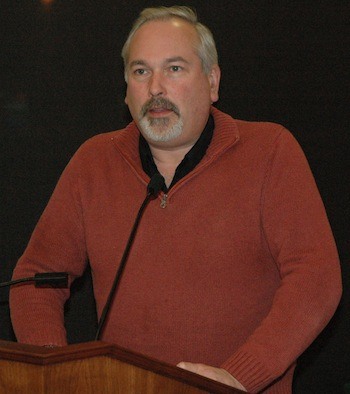ARLINGTON — The Arlington City Council voted by a 6-1 margin on Monday, Feb. 3, to approve an ordinance amending the Arlington Municipal Code to allow the production and processing of recreational marijuana in the city’s light industrial and general industrial zones, and to allow the retailing of recreational marijuana in the city’s general commercial and highway commercial zones.
Paul Ellis, community and economic development director for the city of Arlington, explained to the City Council, before that evening’s public hearing and vote, that this ordinance would impose additional restrictions on the sizes of marijuana production and processing facilities, beyond the state-dictated radiuses of schools, parks, daycares and other areas frequented by children, that such establishments cannot enter. A combination producing and processing facility would be allowed a maximum of 15,000 square feet, with 10,000 square feet set aside for production and 5,000 square feet set aside for processing.
The public hearing prior to the vote drew comment only from Fitz Couhig, CEO of Pioneer Production and Processing, who deemed the proposed ordinance a “socially responsible” measure, and expressed his respect for the city and Council for taking the time to consider it.
“We’re not here to affect the outcome of this vote,” Couhig said. “We just want you to know that we consider this ordinance to be very well-written.”
Council member Dick Butner, who would go on to cast the lone vote against approving the ordinance that night, reiterated his objections to allowing marijuana businesses within the city limits, citing the increased concentration of THC in marijuana over the years as one of its hazards.
“It’s a progressive drug,” Butner said. “It used to be that marijuana’s THC content was half of 1 percent, but by one to two years ago, it was up to 12 percent. We’re going to have problems with this.”
When fellow Council member Marilyn Oertle inquired as to the status of medical marijuana dispensaries and collective gardens within the city limits, Ellis confirmed that the Council’s Aug. 5 prohibition against such establishments remains in effect.
“The state ultimately did a good job with their regulations, so I have to thank them for that,” Council member Chris Raezer said. “How were the zones for the marijuana businesses selected? Had you considered using the same zones as for alcohol?”
“That would have also allowed marijuana in neighborhood commercial zones, many of which would fall within the state buffers,” Ellis said. “It just made sense to concentrate these businesses.”
When Butner inquired about the procedural appropriateness of conducting the vote on the same night as the public hearing, Ellis pointed out that the city was working within deadlines.
“Applications have already been coming in from businesses that are interested in setting up shop here,” Ellis said on Feb. 3. “We’d asked the state for further extensions, but they said they couldn’t grant any more. We have to act tonight.”
After the Feb. 3 City Council meeting, Ellis added that the new ordinance goes into effect on Tuesday, Feb. 11, thereby sunsetting the current moratorium on such marijuana businesses in the process.
“For those businesses that are interested in becoming marijuana producers, processors or retailers within the city of Arlington, they need to submit applications to the state Liquor Control Board as their first step,” Ellis said. “Once the Liquor Control Board has verified those businesses’ locations and qualifications, it will issue them licenses.”
Those businesses may then apply for a city business license with the Arlington Community and Economic Development Offices, located at 18204 59th Ave. NE, from 8 a.m. to 5 p.m. Mondays through Fridays.
“We’re happy to work with any business through this process,” Ellis said. “As they choose their buildings and map out the improvements they’d like to do, we want to help them work all of that out ahead of time. We want all our businesses to get what they need to succeed, with the least amount of imposition.”







